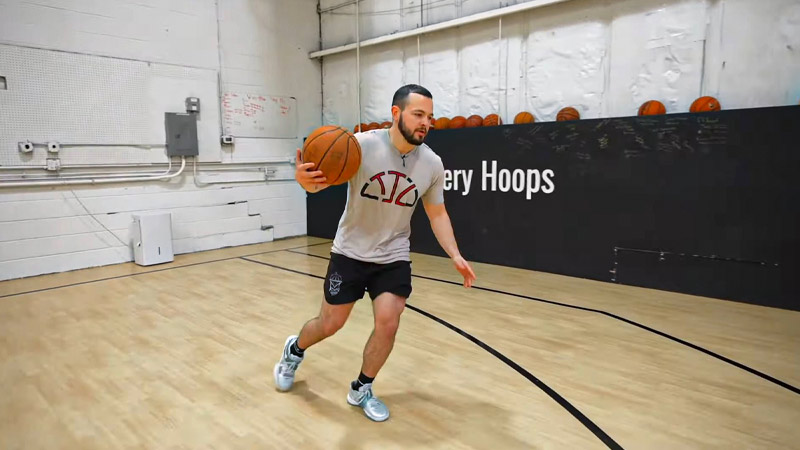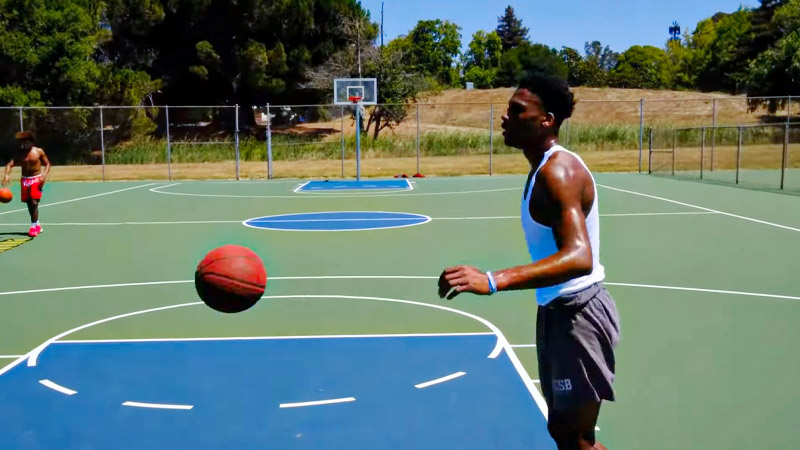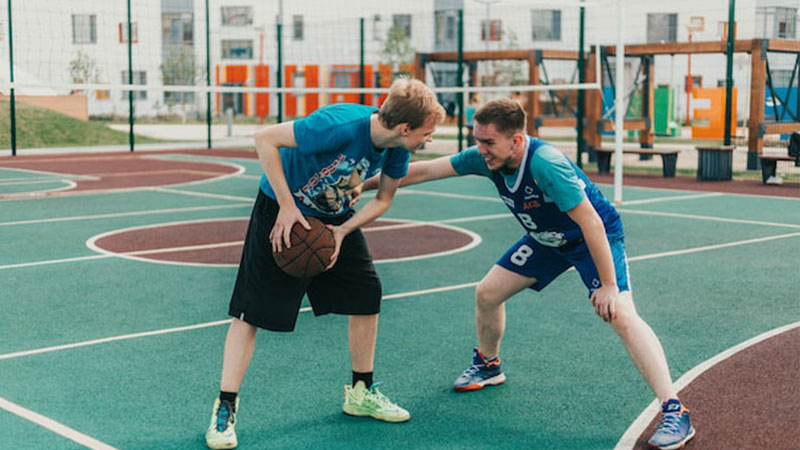Basketball, a sport that originated in the late 19th century, has become a global phenomenon. It is not only a thrilling game to watch but also a fantastic way to stay fit and active.
Whether you play casually with friends or compete professionally, basketball offers numerous health benefits and can be an excellent workout for people of all ages and fitness levels.
Let’s explore whether is basketball a good workout and how it can contribute to your overall fitness.
Is Basketball a Good Workout?
Basketball is a great calorie-burning activity. The high-intensity nature of the sport requires continuous movement and bursts of energy, resulting in significant calorie expenditure. Here are some physical benefits of playing basketball:
Cardiovascular Fitness
Basketball is an intense, fast-paced game that requires constant movement. Running up and down the court, dribbling, passing, and shooting all contribute to improved cardiovascular endurance.
Playing basketball regularly can enhance your heart and lung health, helping to reduce the risk of heart disease and improve overall stamina.
Full-Body Workout
Unlike some sports that primarily focus on specific muscle groups, basketball provides a total body workout. The sport involves running, jumping, sprinting, and quick changes of direction, which engage a variety of muscle groups.
Playing basketball helps build strength and power in the legs, core, arms, and shoulders. Continuous movements such as dribbling and shooting work the upper body muscles, while defensive movements enhance agility and coordination.
Muscle Tone and Endurance
The physical demands of basketball contribute to muscle tone and endurance. The constant running and jumping movements strengthen and tone leg muscles, including the quadriceps, hamstrings, and calves.
The explosive jumps for rebounds and shots engage the glutes, core, and upper body, resulting in a well-rounded and toned physique.
Regular basketball training and gameplay can improve muscle endurance, allowing you to perform physical activities for longer durations without fatigue.
Agility and Coordination
Basketball requires quick reflexes, agility, and hand-eye coordination. Dribbling the ball, passing accurately, and defending opponents all demand precise movements and split-second decision-making.
Regularly participating in basketball can improve your balance, footwork, and hand-eye coordination, which can translate into better performance in other sports and daily activities.
Mental Benefits

In addition to the physical advantages, basketball also offers mental benefits. The fast-paced nature of the game requires constant strategizing, decision-making, and teamwork, enhancing cognitive abilities such as focus, concentration, and problem-solving skills.
Playing basketball can also be an effective stress reliever, as it helps release endorphins, the body’s natural mood enhancers.
Social Interaction
Basketball is often played in teams, making it a great social activity. Joining a basketball league or playing pick-up games with friends provides an opportunity to meet new people, build friendships, and strengthen existing relationships.
The social aspect of the sport can contribute to improved mental well-being and a sense of belonging.
While basketball offers numerous health benefits, it’s important to keep safety in mind. Warm up properly before playing to prevent injuries, wear appropriate footwear to support your feet and ankles, and stay hydrated throughout the game.
Weight Loss
Basketball can be an effective tool for weight loss and weight management. The combination of aerobic exercise and strength training elements in basketball helps burn calories and build lean muscle mass.
According to the American Council on Exercise, a person weighing around 160 pounds can burn approximately 584 calories during an hour of playing basketball.
The actual calorie burn may vary depending on factors such as intensity, duration, and individual characteristics.
Increased Metabolic Rate
Engaging in activities that raise your heart rate and challenge your muscles can lead to an increased metabolic rate. Basketball, with its fast-paced movements and explosive actions, can elevate your heart rate and stimulate your metabolism, even after you’ve finished playing.
This means that your body continues to burn calories at a higher rate even during periods of rest.
Improved Body Composition
Regular participation in basketball can help improve body composition by reducing body fat and increasing lean muscle mass.
The combination of cardiovascular exercise, strength training, and agility movements in basketball contributes to a toned physique and a higher percentage of muscle, which can lead to a more efficient metabolism.
Enhanced Flexibility
Basketball involves a wide range of movements, including stretching, reaching, and bending. These actions help improve flexibility and joint mobility.
Regular stretching and dynamic movements during basketball can increase your range of motion and flexibility, reducing the risk of injuries and promoting better overall physical function.
Bone Strength

Basketball is a weight-bearing activity, which means it puts stress on your bones. This stress stimulates bone growth and helps increase bone density, making them stronger and less susceptible to conditions like osteoporosis.
Engaging in weight-bearing exercises like basketball can have long-term benefits for maintaining healthy bones.
Mental Benefits of Basketball
Basketball not only offers physical benefits but also provides several mental benefits. Here are some of the mental advantages of playing basketball:
Stress Relief
Engaging in physical activity, including basketball, triggers the release of endorphins, which are natural mood-enhancing chemicals in the brain.
Playing basketball can help reduce stress levels and alleviate symptoms of anxiety and depression. The focus required during gameplay can act as a distraction from everyday worries, allowing players to experience a sense of relaxation and mental rejuvenation.
Cognitive Function and Mental Sharpness
Basketball requires quick decision-making, strategic thinking, and problem-solving skills. Players must analyze the game, anticipate movements, and make split-second decisions on passes, shots, and defensive maneuvers.
Regularly participating in basketball can enhance cognitive function, including memory, attention, and concentration, contributing to improved mental sharpness both on and off the court.
Self-Confidence and Self-Esteem
As players develop their skills, improve their performance, and achieve personal goals in basketball, it boosts their self-confidence and self-esteem.
Mastering new techniques, making successful plays, and contributing to the team’s success can provide a sense of accomplishment and self-assurance.
This increased confidence can translate into other areas of life, fostering a positive self-image and mental well-being.
Discipline and Goal Setting
Basketball requires discipline and dedication to improve skills and performance. Regular practice sessions, adhering to training schedules, and working on specific areas for improvement instill discipline and a strong work ethic.
Setting goals, such as improving shooting accuracy or becoming a better defender, can provide a sense of purpose and motivation. Learning to set and achieve goals in basketball can transfer to other aspects of life, promoting personal growth and success.
Teamwork and Social Interaction
Basketball is often played in teams, fostering a sense of camaraderie and promoting social interaction. Collaborating with teammates, communicating on the court, and working together to achieve a common goal improve interpersonal skills and build relationships.
The social aspect of basketball can provide a support system, increase social connectedness, and reduce feelings of loneliness or isolation.
Resilience and Mental Toughness
Basketball, like any competitive sport, presents challenges and obstacles. Dealing with losses, setbacks, and adversity on the court can help develop resilience and mental toughness.
Learning to bounce back from defeats, stay focused under pressure, and maintain a positive mindset can be valuable skills in navigating life’s challenges outside of basketball.
It’s important to note that while basketball can provide mental benefits, it is not a substitute for professional mental health support. If you’re experiencing persistent mental health issues or concerns, it’s recommended to seek guidance from a qualified healthcare professional.
Is Basketball A Good Way to Lose Weight?

Yes, basketball can be an effective way to lose weight. It is a high-intensity sport that involves constant movement, sprinting, jumping, and quick changes of direction, which can result in significant calorie expenditure. Here’s why basketball can be a good way to lose weight:
Calorie Burning
Basketball is a physically demanding activity that requires a lot of energy. The fast-paced nature of the game, combined with the continuous movements and bursts of intensity, can lead to a high-calorie burn.
Running up and down the court, dribbling, shooting, and defending opponents all contribute to increased energy expenditure.
The exact number of calories burned will depend on factors such as your body weight, intensity of play, and duration of the game, but playing basketball can help create a calorie deficit, which is necessary for weight loss.
Cardiovascular Exercise
Basketball is an excellent cardiovascular workout. The constant running and sprinting involved in the game elevate your heart rate and increase your cardiovascular endurance.
Engaging in sustained cardiovascular exercise helps improve your cardiovascular health, burn calories, and contribute to weight loss. Regular basketball sessions can improve your overall fitness level and make other physical activities feel easier.
Full-Body Workout
Basketball engages multiple muscle groups throughout the body, providing a full-body workout. The running, jumping, and explosive movements work the lower body muscles, including the quadriceps, hamstrings, glutes, and calves.
Dribbling, passing, and shooting engage the muscles in the arms, shoulders, and core. By involving multiple muscle groups simultaneously, basketball helps increase muscle mass and metabolic rate, which can contribute to weight loss.
Interval Training
Basketball naturally incorporates interval training, which is an effective method for weight loss. Interval training involves alternating between high-intensity bursts of activity and periods of rest or lower intensity.
In basketball, you experience intense periods of sprinting, jumping, and quick movements, followed by brief periods of slower activity or rest during stoppages in play. This interval training approach can enhance calorie burning and fat loss.
Enjoyment and Sustainability
One of the keys to successful weight loss is finding an activity that you enjoy and can sustain over time. Basketball can be a fun and engaging sport, allowing you to focus on the game and enjoy social interaction with teammates.
When you find an exercise that you genuinely enjoy, you are more likely to stick with it in the long run, leading to sustainable weight loss and overall fitness.
Is Basketball Better than Running?

Whether basketball is better than running depends on your personal preferences, goals, and individual circumstances. Both activities have their own unique benefits. Let’s compare them:
Cardiovascular Fitness
Both basketball and running are excellent for improving cardiovascular fitness. Running is a straightforward aerobic exercise that primarily focuses on cardiovascular endurance. It can be easily adjusted for intensity and duration based on your fitness level and goals.
Basketball, on the other hand, combines cardiovascular exercise with bursts of anaerobic activity, such as sprinting and jumping. The intermittent high-intensity movements in basketball can provide an additional challenge to your cardiovascular system.
Full-Body Workout
While running primarily engages the lower body muscles, basketball offers a more comprehensive full-body workout. Basketball involves running, jumping, dribbling, shooting, and defensive movements, which engage the legs, core, arms, and shoulders.
The multidirectional movements in basketball contribute to improved agility, coordination, and overall body strength. If you’re looking for a sport that targets multiple muscle groups, basketball may be a better option.
Social Interaction
Running is often a solo activity, providing solitude and time for self-reflection. It can be a great way to clear your mind and enjoy some alone time. On the other hand, basketball is a team sport that fosters social interaction and camaraderie.
Playing basketball with friends or joining a league can offer a social experience, which may be more appealing to individuals who enjoy group activities and the competitive nature of team sports.
Variety and Enjoyment
Running typically involves repetitive motion and can become monotonous for some individuals. In contrast, basketball offers a dynamic and constantly changing environment.
The strategic elements, fast-paced nature, and variety of movements in basketball can make it more engaging and enjoyable for those who prefer a diverse workout experience.
Impact and Joint Stress
Running is a high-impact activity that puts stress on the joints, particularly the knees and ankles. Individuals with joint issues or injuries may find basketball’s frequent jumping and landing movements more challenging.
Basketball involves more lateral movements, quick changes of direction, and contact with other players, which may increase the risk of injury compared to running.
It’s important to consider your own physical condition and consult with a healthcare professional if you have concerns about joint health or pre-existing injuries.
Ultimately, the choice between basketball and running depends on your personal preferences, fitness goals, and individual circumstances.
FAQs
Can basketball help me lose belly fat?
Basketball can contribute to overall weight loss, including reducing belly fat. The combination of cardio exercises, such as running and jumping, along with the engagement of core muscles during movements like dribbling and twisting, can help burn calories and tone the abdominal area.
However, it’s important to remember that spot reduction is not possible, so consistent cardiovascular exercise, strength training, and a balanced diet are key for losing belly fat.
How many calories can I burn playing basketball?
The number of calories burned during basketball depends on various factors, including body weight, intensity of play, and duration of the session. On average, a person weighing around 160 pounds can burn approximately 584 calories per hour of playing basketball.
Heavier individuals may burn more calories, while lighter individuals may burn fewer. It’s important to note that these numbers are estimates, and individual calorie burn may vary.
Can basketball help me build muscle?
Yes, basketball can contribute to muscle building and toning. The game involves running, jumping, and quick movements that engage multiple muscle groups simultaneously. Regular play can lead to increased muscle strength and endurance, particularly in the legs, core, and upper body.
Additionally, explosive actions like jumping for rebounds and shooting require power and can help build lean muscle mass.
Is basketball suitable for all fitness levels?
Basketball can be enjoyed by individuals of various fitness levels. While it may initially be more challenging for beginners, as they develop their skills and stamina, they can gradually improve and enjoy the physical benefits.
It’s important to listen to your body, start at a comfortable level, and gradually increase intensity and duration to avoid overexertion or injury.
Additionally, modifications and adaptations can be made to accommodate different fitness levels during gameplay.
Can I play basketball if I have joint issues?
If you have joint issues, it’s essential to consult with a healthcare professional before engaging in any physical activity, including basketball. Depending on the severity and type of joint issue, modifications may need to be made to reduce stress on the joints.
Low-impact activities like swimming or stationary biking may be recommended as alternatives. However, in some cases, basketball can still be played with proper warm-up, appropriate footwear, and modifications to movements to reduce impact and stress on the joints.
Final Words
So, now you know whether is basketball a good workout. In summary, basketball is not only an exciting and competitive sport but also an excellent workout.
It improves cardiovascular fitness, builds strength and endurance, enhances agility and coordination, and provides mental and social benefits.
Whether you play casually or competitively, basketball can be a great addition to your fitness routine, helping you stay active, healthy, and engaged in a sport that has captivated millions around the world. So grab a ball, hit the court, and enjoy the physical and mental benefits that basketball has to offer.







